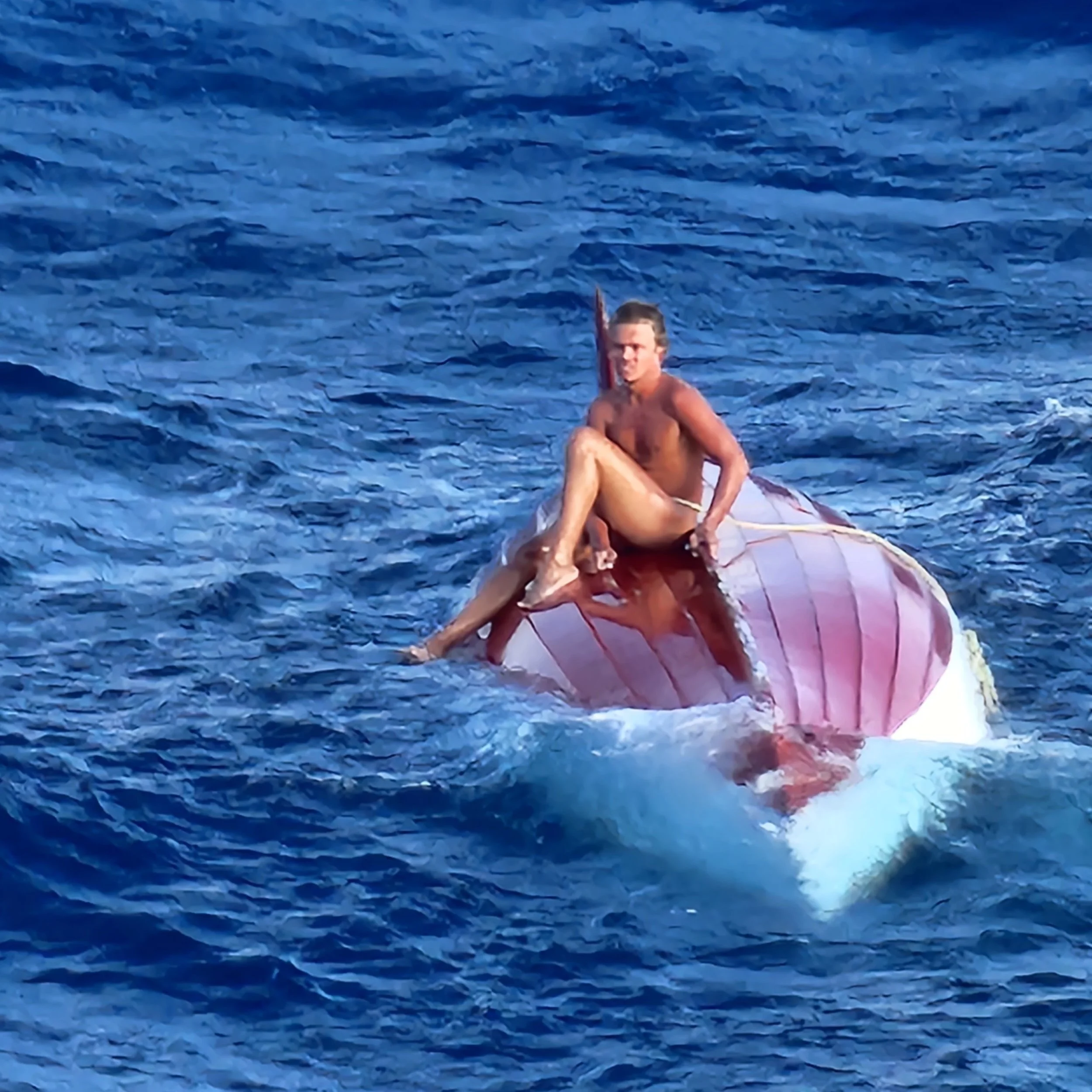So Close, But so Much Admiration
Tom first contacted SWS almost two years ago. I had heard that a young Queensland man had decided to build a rowing boat and cross the Pacific…alone. I was interested, but sceptical. I’m a big supported of adventure, heaven knows we need more of it, but was this a real project or was he just a dreamer? I was on board FAIR WINDS sailing out of the Derwent when I first spoke with him. It took me two minutes to realise that Tom was different. He was always going to walk the walk, not just talk the talk. Well, over the 22 articles that we have published from his Pacific Crossing we have come to admire not only his stamina and his writing and his modesty, but his attitude, approach and dare I say it, humanity. So when we received an email from his shore team earlier this week saying that the voyage was over, frustratingly close to Australia, we were shocked that it had ended this way and relived that Tom was OK. Tom’s latest blog post, in the understated and self depricating style that we have got used to, explains what happened.
The best-laid plans of mice and men… By Tom Robinson.
Greetings from Brisbane, Australia, where I have been now for the past 48 hours after a flight from Auckland on Monday evening. What a journey it has been since that fateful afternoon of the 5th of October.
It was my fourth day at sea since my departure from Luganville, Vanuatu, on the last leg of my journey across the Pacific. I was hoping to make landfall in Australia in approximately 50 days. I was just settling into what I knew would be a wet and bumpy passage back home, with Vanuatu experiencing its windiest season in over five years.
All day I had been rowing quite comfortably, Maiwar was making her way westward at a good rate of knots and I had stayed basically dry while rowing with the 20-25 knot south-easters on the beam. At about 4:00pm local time I hung up the oars a little early and retired to the cabin to do a bit of navigating and prepare for dinner. As usual, I had been in the nude most of the day, as chafe is always an issue and, in those conditions, it only takes a few days to run out of dry clothes. Once inside the cabin I contemplated closing the hatch, but decided against it, as the conditions were relatively benign – a fateful error of judgment.
I was sitting on my bunk, looking out the hatch, and then, in a split second, my whole world was turned upside down. My view turned from blue sky to blue water, a huge crashing sound was heard, and Maiwar was capsized like a bath toy. There was no time for fear or even a communicable thought, it all happened so quickly. The next moment I was holding my breath, I looked around me in complete shock, identified the open hatch, swam through it and made my way under the boat, through the afternoon-light pierced blue water and came up to the surface, gasping for breath as I grabbed onto the gunwale of an upturned Maiwar. My first thought was “Oh my God, it’s happened, the worst possible scenario has just become my reality”. I scrambled onto the upturned hull and took stock of the situation. By this stage it was getting dark, and I knew that of the two emergency position indication beacons (EPIRBS) I had on board, at least one would already be going off. I then re-entered the water and grabbed a heavy line, tied it to the rowlock on the starboard side of the boat, and climbed back on top of Maiwar. I then began to lean outboard with all my weight in an attempt to right the boat. After a few tries I quickly realised that it was not going to happen before darkness set in, as by then it would be too dangerous to attempt anything further.
I then tied the heavy sea-anchor line across the boat with enough room for a loop around my waist. In rapidly fading light I swam back under the boat and removed one of the EPIRBS from its holster and attached the lanyard to my wrist. For the next 14 hours I clung to the bottom of the boat, one hand gripping the keel, the other holding onto the EPIRB. Sometimes it took all my strength not to be washed off the boat by breaking waves.
Just after dark the full gravity of the situation began to sink in, doubt started to creep in, and the thought of making it out alive seemed very slim indeed; it was not a good headspace to be in. The EPIRB was flashing, but I had no idea whether my distress message had been received, and if, or when, help would arrive. Not long after, I came to grips with my situation and began to make plans. I decided to stay atop Maiwar for the night, then, on daybreak, try once again to right the boat, this time by moving stores around and flooding certain sections of the hull. The morning would also bring the chance to get food and water. But before any of this I had to survive the night.
I kept my chin up, and tried to make the most of a less than ideal situation. The way I looked at it, the worst possible thing that could have happened, had happened, so things could only get better from there on in. I began to sing: S.O.S by ABBA played on a continuous loop for a few hours while I contemplated my situation. I began to feel remarkably positive about the whole ordeal, and couldn’t help but smile in the face of adversity. If it was adventure I was looking for, I had certainly found it! As the night wore on, and on, and on, I came to terms with the fact that it would probably be the longest night of my life. I shuddered at the thought of a seemingly endless night still ahead of me.
With all the hardship I was facing, the worst by far was the cold. Not since rowing up the South American coastline had I felt the need to wear a jumper or wrap myself in a sleeping bag, and there I was, stark naked and shivering through the night. Of course, the best remedy for physical discomfort is a strong mindset, and if there’s one thing that a rogue wave couldn’t take away from me, it was my strong mind and positive outlook. I thought warm thoughts, imagined a bonfire on Maiwar’s bottom, and relished the few times I was able to urinate on myself. But mostly I kept my mind active to distract my senses from the hardship that surrounded me; really no different from what I had been doing for the past year.
And then, before I knew it, a faint blue appeared in the east, I couldn’t believe it, already the night was over, and soon enough the sun would rise and warm my body, the day would begin, and my lot would improve. The longest night of my life had been shorter than I had expected.
About an hour later a black silhouette appeared on the horizon. A Ship!. I cried out for joy, safety was coming, it was all going to be alright.
I have now been back home for two days, and have barely had a minute to myself. The strangeness of the whole situation has not yet left me, and the lens through which I view the world is still slightly refracted, but there is one thing that has become very clear indeed: It was all worth it, every last minute, and to lament even a single moment would be an equally fateful error.
Of the handful of people I have seen since my return, they seem to meet me with a melancholic smile, the corners of their mouths turn down and their eyes say sympathy very softly.
Sympathy!
Sympathy?
Sympathy be damned!
I made a mistake and I paid the price.
So what if the ending was not how I expected? So what if the record was left unbroken and the Pacific left uncrossed? So what?
When I departed Peru 15 months ago perhaps it was not clear, even to myself, why I was rowing across the Pacific, but since then it has become well and truly clear. It wasn’t about breaking a record; it wasn’t about the final destination. Fame and glory can go the way of sympathy. They can all be damned. I went out into the Pacific chasing adventure, proper old-fashioned seat-of-the-pants adventure. I went out into the Pacific to test myself, to challenge myself, to come face to face with the raw elements of man and nature; to learn what I could endure, how strong I was, how far mother nature could push me – where the limit lay. I went out into the Pacific to explore, to taste a different way of life, to live purposefully, traditionally and above all, happily.
Success can be measured any way you like, indeed it’s one of the true beauties of life. Make it what you will, but above all, take away from it what you will. Before this journey of mine began I had no idea just how adventurous it would be, just how fulfilling, how beautiful, how hard, how torturous and how exciting it would all be. Real adventure is not a thing of the past, I discovered for myself that it’s still out there, alive and well, the ripe fruit are there for the picking.
So do not lament for what could have been, for what went wrong and for what was expected. Do not frown. Please, rejoice with me.
If there is one thing I have heard over and over again, it’s that those of you at home have enjoyed living this adventure vicariously through me, perhaps a rare chance to follow me through the far reaches of the earth and mind, where few ever go. And now, I look back on what has been, on every moment of despair and joy, and everything in between, and I cannot help but smile. I’m back home, an immense weight has been lifted off my shoulders, a weight I have carried for many years, and I cannot help but rejoice. Rejoice for what has been and for what is yet to come in life.
In a short note I must, of course, thank the thousands of people around the world who have supported me on this journey. It is only through the kindness, generosity and love of so many individuals that my adventure was successful. I cannot thank enough my family who supported me tirelessly from the very beginning, and who had a bit of a scare last week. The team at Off Center Harbor have been unwavering in their support and willingness to share my footage around the globe. To the Australian Maritime Safety Authority, MRCC Noumea and all the staff of P&O Pacific Explorer, without your help I simply would not be writing this. I would also like to apologise to the passengers whose holiday was interrupted by my situation. Once again, thank you all so much for your support, and I look forward to continue sharing the story with you in the coming weeks.
For background Tom’s journey visit the archives


